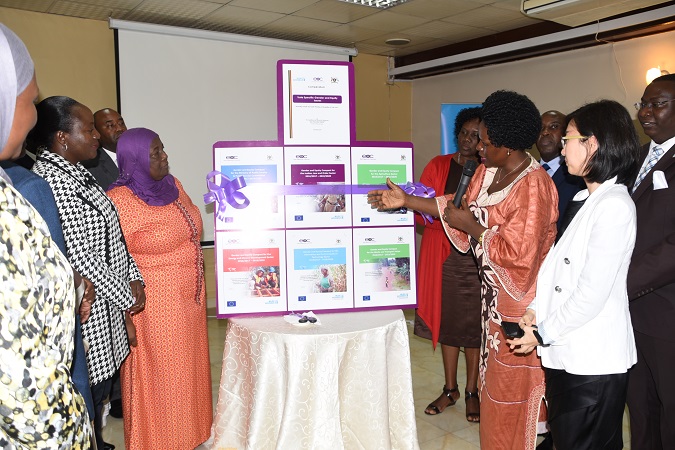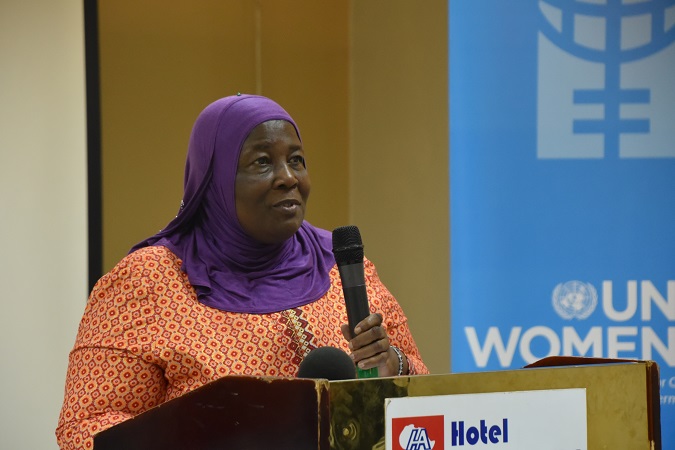UN Women and Government of Uganda launch Gender and Equity Budgeting reference tools
Date:

Minister of Gender, Labour and Social Development, Hon. Janat Mukwaya launches the Gender and Equity Compacts for different sectors with the Equal Opportunities Commission and UN Women. Photo: UN Women/ Aidah Nanyonjo
On 25th January 2018, UN Women in partnership with Equal Opportunities Commission (EOC) of Uganda launched Gender and Equity Budgeting reference tools for sector Ministries, Departments and Agencies (MDAs). The tools were launched by the Minister of Gender, Labour and Social Development, Hon. Janat Mukwaya at Hotel Africana in Kampala.
The reference tools included, Gender and Equity Compacts for 8 sectors, the National Gender and Equity Compendium for 139 votes (MDAs), and the Gender and Equity Compliance Guide for Parliament to support and strengthen key actors along the gender and equity budgeting accountability chain. The targeted sectors are Education and Health, Agriculture; Works and Transport; Energy and Mineral Development; Information and Communications Technology; Justice, Law and Order; and the Public Service which are the backbone sectors of Uganda.
By the provisions in the Public Finance Management Act 2015, all Government entities of Uganda are obliged to comply with the gender and equity requirements and obtain the gender and equity certificates for their annual budget papers to be approved. To assist this implementation, sector-specific tools for gender and equity-responsive planning and budgeting were developed by the EOC and UN Women in collaboration with the National Taskforce on Gender and Equity which is chaired by the Ministry of Finance, Panning and Economic Development with financial support from the European Union and the Embassy of Sweden.
While launching the reference tools, Hon. Mukwaya said: “Responding to the needs of all Ugandans when making sector plans and budgets will not only demonstrate the pride we have for our people but also enhance more trust from the people we are appointed to serve”. Adding that, “Making discriminative plans and budgets is a demonstration of directly challenging the humanity of left out Ugandans. Therefore, all sections of government ought to commit to put to use the materials that are due for launch today for the very purpose intended.”
Ms. Anna Mutavati, the Deputy Country Representative/OIC of UN Women complimented the Government of Uganda on becoming a country to learn from regarding gender responsive budgeting regionally as well as globally. She stressed that gender and equity responsive planning and budgeting is a strategy and tool to achieve the goal of gender equality and leaving no one behind. She raised a priority agenda of how to ensure the legislation and accountability mechanisms gained to be delivered to the change of life of women and girls on the ground.
In her remarks, Ms. Sylvia Ntambi, Chairperson of EOC acknowledged various stakeholders and development partners for the support extended to Uganda to enhance equal opportunities for all in its planning and budgeting at various levels.

About 100 participants from the Government, CSOs and the Academia attended the launch event and discussed the achievement, challenges and a way forward in gender and equity budgeting.
UN Women is working with the Government of Uganda for the governance and national planning to fully reflect accountability for gender equality commitments and priorities. Collaborating with the Equal Opportunities Commission which has the mandate of assessing the level of compliance with gender and equity requirements of the Government entities’ annual budget papers, UN Women takes a comprehensive approach along the gender and equity accountability chain. Our support to strengthen the systems and capacities of diverse stakeholders engages with the Gender and Equity Assessors; Central and Local Governments which plan and implement the budgets; Parliament which oversees and approves the budget; and women’s CSOs who hold the Government accountable. With support from the European Union, UN Women equipped 200 Government officials from more than 6 sectors with knowledge and skills in sector-specific gender responsive planning and budgeting. This contributed to trained sectors’ improvement in the level of compliance with gender and equity requirement in FY 2017/18. In addition, launched reference tools will guide the sector MDAs with substantive gender and equity issues, corresponding intervention options and performance indicators in their budgeting. It will also support Parliamentary Committees’ budget oversight functions.
Further, UN Women will keep working with the EOC and the Ministry of Finance in tracking the sector budgets and expenditures allocated to gender and equity; in supporting selected sector MDA’s gender and equity-responsive service delivery; in monitoring sectors’ gender-responsive progress in linkage to the national standard indicators and gender statistics; and in strengthening the Local Government’s capacity in gen